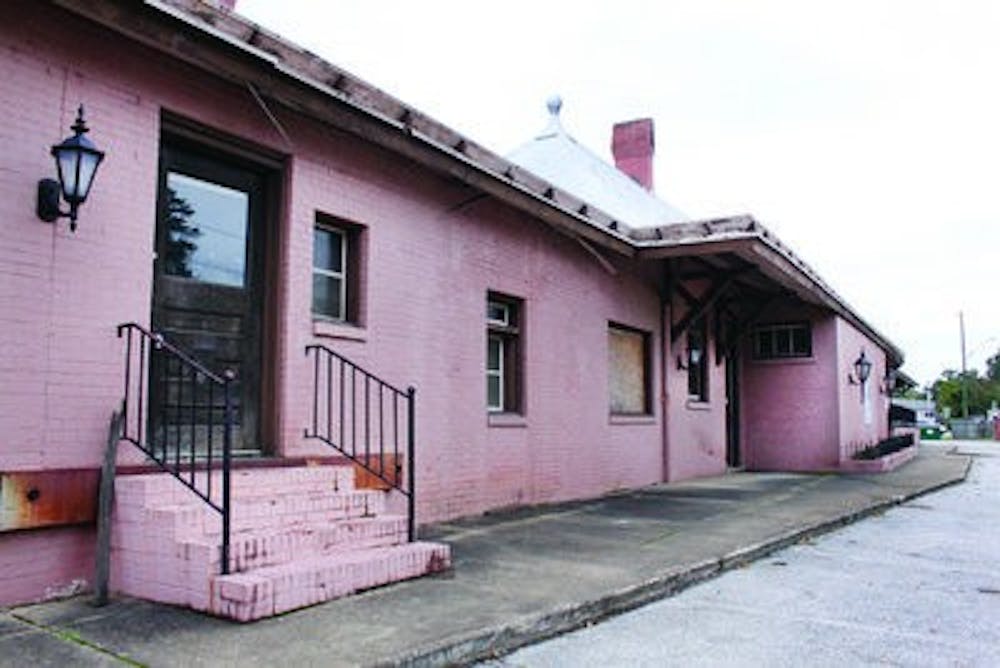This pink brick building on Mitcham Avenue may go unnoticed. Today, its only use is for gameday parking, but in years past the Auburn train depot served as a hub of activity in the town.
The current depot, which has been vacant since 2003, was put on the 2010 Places in Peril list through the Alabama Trust for Historic Preservation. Not much has changed since.
"The intent of putting things on the Places in Peril list is to try to get them not to be in peril," said David Schneider, executive director of the Alabama Trust for Historic Preservation. "We've had quite a few sites over the years that publicity was enough to find the right person that came in and saved the day."
The train station has not had such luck. Matt Mosley, Auburn planner and staff representative for the historical preservation commission, said the building is structurally sound, but in need of exterior repairs such as the replacement of rotted wood, window repairs and new paint.
"We're interested in preserving that piece of history," Mosley said. "We really feel that the depot is the centerpiece of the North College historic district."
The current depot was built in about 1905 after the first depot was attacked during the Civil War and the second burned. It was the gateway for travelers to Auburn, whether dignitaries or students.
It was near this site where Auburn students greased the tracks when the Georgia Tech football team came into town--a story that has been told and retold, and led to a popular pajama pep rally.
"There's a lot of opportunities for the depot," said Charlie Duggan, Auburn city manager. "I'm sure we will do everything we can to work with anyone who wants to rehabilitate the depot."
The city once had plans to make the purchase. Those plans disintegrated, however, when costs couldn't be negotiated for the building which Duggan described as having "quite a lot of charm, but needs some specialized care."
"The city council had some requirements to complete all the environmental studies," Duggan said. "It kind of fell apart from there."
Any future use of the depot and the land on which it sits would need to be preceded by environmental studies, Mosley said.
"It may take some deeper environmental cleanup," Mosley said. "Someone would do an environmental assessment of the site and the building ... They would be looking at whether fuel or other material leeched into the topsoil, or maybe some metals."
Environmental issues are a concern because trains were refueled at the site, and the Spur gas station adjacent to the depot has underground tanks.
"Right now I think the best thing for the building is that they keep the water out of it, and it could sit there until hopefully the right person comes along," Schneider said.
Wayne Russell purchased the building about 10 years ago. He has since transferred ownership to his three children, and the property is in the name of MRT, LLC out of Montgomery.
"When it came up for sale, we thought it was a good buy," said Russell, who had already purchased the Spur gas station. "I'd like to sell the whole thing and see it looking like it did when it was originally built."
Russell said they are asking $1 million for the depot and gas station, a figure Schneider called an "awfully large price for that piece of property."
"A purchase price like that scares a lot of people away," Schneider said. "The economy being what it is, it's hard to find people to invest in a project like that right now."
Russell said he still thinks ownership by the city or another government agency would be the best option.
"That way they could keep it up and keep it intact and make it a showpiece," Russell said. "Nothing would be better than the City of Auburn owning it, or some federal agency."
But city ownership isn't the only option, and Duggan said the city hasn't talked about purchasing the depot in recent years.
"I think the city should be very careful about buying things that we don't have an identifiable use for," Duggan said. "What would the city do if we owned it?"
Russell said while they have had three or four interested parties, price remains an issue.
"I hate to see it in the state it's in now," Russell said. "We've tried to patch up and board up until we can get it sold."
Do you like this story? The Plainsman doesn't accept money from tuition or student fees, and we don't charge a subscription fee. But you can donate to support The Plainsman.





